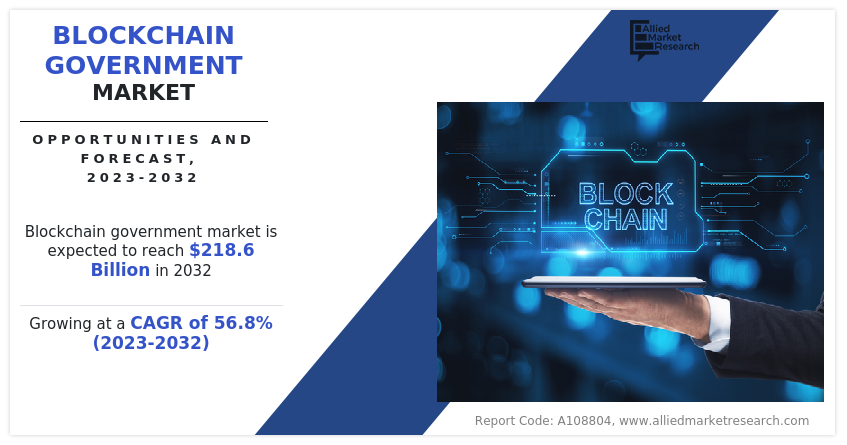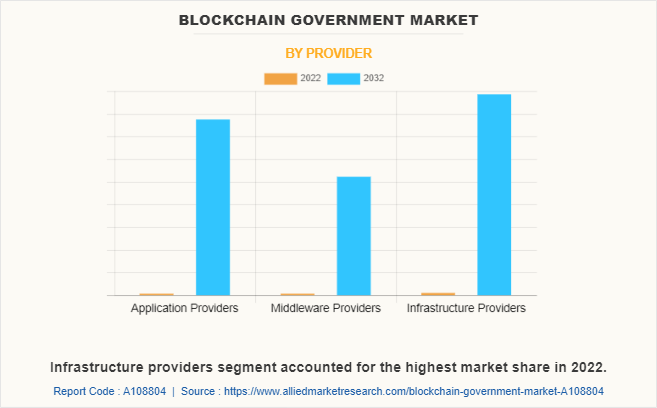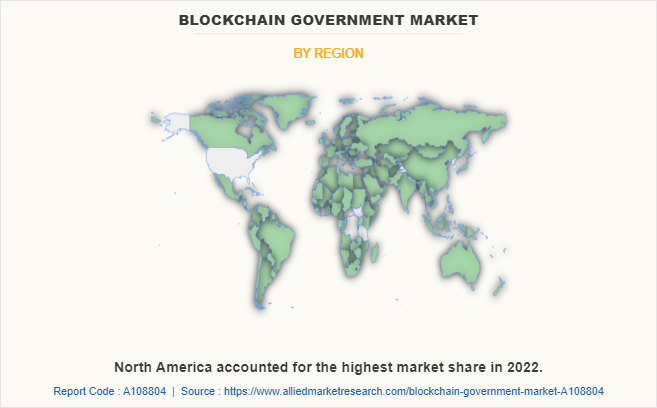Blockchain Government Market Research, 2032
The global blockchain government market was valued at $2.5 billion in 2022, and is projected to reach $218.6 billion by 2032, growing at a CAGR of 56.8% from 2023 to 2032.
Blockchain government refers to the application of blockchain technology within the operations and systems of governmental organizations. Blockchain is a distributed and decentralized ledger technology that enables secure and transparent record-keeping and transactions. When implemented in government processes, it can provide numerous benefits such as increased efficiency, improved transparency, enhanced security, and reduced fraud. Blockchain enables the creation of a transparent and immutable record of transactions and data.

Rise in interest of government sector in adopting blockchain technology is a key driver of the blockchain government market. Blockchain technology is a sophisticated database technique that enables the transparent sharing of information within a business network. Blockchain technology can be used to establish an immutable ledger for recording orders, payments, accounts, and other transactions.
Moreover, it provides various benefits such as proper and secure storage of government data, reduction of labor-intensive processes, reducing excessive costs associated with managing accountability, reduction of labor-intensive processes, reduced potential for corruption and abuse, and increased trust in government and online civil systems. All these factors are escalating the growth of blockchain government industry. In addition, increase in need to protect against data tampering and surge in blockchain technology to form transparent and decentralized government are the major factors driving the growth of the market.
However, lack of awareness regarding the blockchain technology is a major factor hampering the growth of the market. The primary issue facing businesses using blockchain, particularly small- and medium-sized businesses, is that most of businesses are unaware of the technology and do not fully comprehend the technology use and advantages. This is mostly due to the technical expert dominance in the blockchain industry and their excessive technical mindset. Contrarily, the growing career paths in blockchain technology presents a significant opportunity for the blockchain government market. Blockchain technology has created a range of growing career paths that offer exciting opportunities for professionals looking to specialize in this field. There is an increasing demand for blockchain content writers, which is providing a huge window for this market to grow.
The report focuses on growth prospects, restraints, and trends of the blockchain government market analysis. The study provides Porter’s five forces analysis to understand the impact of various factors, such as bargaining power of suppliers, competitive intensity of competitors, threat of new entrants, threat of substitutes, and bargaining power of buyers, on the blockchain government market.
The blockchain government market is segmented into Provider and Application.
Segment Review
The global blockchain government market is segmented on the basis of provider, application, and region. On the basis of provider, the market is categorized into application providers, middleware providers, and infrastructure providers. By application, it is segregated into identity management, asset registry, smart contracts, payments, voting, and others. Region wise, it is analyzed across North America, Europe, Asia-Pacific, and LAMEA.

By provider, the application providers segment attained the highest growth in 2022. This is attributed to the fact that the application providers are developing customized blockchain solutions that address the unique requirements of government operations. They work closely with government agencies to understand their pain points, regulatory frameworks, and security concerns, and then design blockchain applications that align with those requirements. Furthermore, governments worldwide are initiating programs and allocating funds to explore and implement blockchain solutions. These government initiatives provide financial support, resources, and partnerships for application providers to develop innovative solutions.
However, the infrastructure providers segment is considered to grow at the fastest rate during the forecast period, as infrastructure providers are leveraging cloud computing services to offer scalable and flexible infrastructure solutions to government agencies. Cloud-based infrastructure enables rapid deployment, on-demand scalability, and cost efficiencies, allowing government entities to focus on their blockchain applications rather than infrastructure management.

Region wise, North America attained the highest growth in 2022, as governments in North America are increasingly conducting pilot projects and proof of concepts to explore the potential of blockchain technology. These initiatives allow governments to test the feasibility and benefits of blockchain in specific use cases before implementing them on a larger scale. Examples include blockchain-based voting trials and land registry experiments. Moreover, digital identity is a significant area of focus in the blockchain government market opportunities.
However, Asia-Pacific is expected to exhibit the highest growth rate during the forecast period. This is attributed to the fact that digital identity solutions are gaining traction in Asia-Pacific, with governments exploring blockchain technology for secure and decentralized identity management systems. Blockchain-based identity solutions provide citizens with control over their personal data and enable seamless access to e-government services. Several countries in the region are implementing blockchain-based identity systems for various public services.
The report analyzes the profiles of key players operating in the blockchain government market outlook such as IBM, Microsoft, SAP SE, Oracle, Amazon Web Services, Inc., Infosys Ltd, Bitfury Group Limited., BLOCKO Inc., RecordsKeeper, and Auxesis Services & Technologies (P) Ltd. These players have adopted various strategies to increase their market penetration and strengthen their position in the blockchain government market.
Market Landscape and Trends
The adoption of blockchain technology in government sectors has been gaining significant momentum in recent years, transforming the way governments operate and interact with their citizens. Governments are recognizing the potential of blockchain to securely store and manage citizen identities, reducing identity theft and fraud. Blockchain-based digital identities enable individuals to have control over their personal data, while also facilitating seamless and trustless interactions with government services.
Moreover, blockchain is revolutionizing voting systems and ensuring transparent and tamper-proof elections. By leveraging blockchain's immutability and transparency, governments can eliminate electoral fraud, enhance voter confidence, and streamline the entire voting process. Blockchain-based voting platforms further enable real-time vote counting and auditing, increasing the efficiency and accuracy of election results. In addition, blockchain is revolutionizing voting systems and ensuring transparent and tamper-proof elections. By leveraging blockchain's immutability and transparency, governments eliminates electoral fraud, enhance voter confidence, and streamline the entire voting process. Blockchain-based voting platforms further enable real-time vote counting and auditing, increasing the efficiency and accuracy of election results. Therefore, the blockchain government market is constantly evolving, with new trends emerging as the technology advances.
Top Impacting Factors
Rise in Interest of Government Sector in Adopting Blockchain Technology
Blockchain technology is a sophisticated database technique that enables the transparent sharing of information within a business network. Blockchain technology can be used to establish an immutable ledger for recording orders, payments, accounts, and other transactions. Moreover, it provides various benefits such as proper and secure storage of government data and reduction of labor-intensive processes. In addition, it minimizes costs associated with managing accountability, lowers the risk of corruption and abuse, and increases trust in government and online civil systems. All these features are escalating the growth of blockchain government market size.
Furthermore, various governments are utilizing the blockchain technology to improve their operations. For instance, Denmark Ministry of Foreign Affairs partnered with virtual currency platform Coinify to use blockchain in foreign aid delivery. The time and money saved by avoiding the involvement of a third-party financial institution are the main advantages of blockchain for Denmark. Hence, these factors are expected to boost the growth of the blockchain government market share during the forecast period.
Increase in need to Protect Against Data Tampering
Rise in unauthorized data modification activities is driving the growth of the market. Blockchain technology supports immutability, making it difficult to alter and change previously recorded data. In addition, blockchain technology provides transparency, as any network member can verify data recorded into the blockchain, thus preventing the chances of data tampering. Moreover, the transparent and auditable nature of blockchain allows citizens, stakeholders, and government agencies to independently verify the integrity of transactions and data. This transparency reduces the risk of data tampering and strengthens trust in government processes, promoting a more accountable and reliable governance system. In addition, data tampering in elections may have severe consequences for democratic processes. Blockchain-based voting systems provide transparent and tamper-proof records of votes, ensuring the integrity of the electoral process.
Furthermore, blockchain-based identity management systems provide robust protection against data tampering and unauthorized modifications. Personal data stored on a blockchain can be cryptographically secured and accessed only by authorized individuals. This ensures that citizens have control over their own information and reduces the risk of identity theft or fraud. Therefore, these trends are contributing to the growth of the blockchain government market demand.
Surge in Blockchain Technology Utility to form Transparent and Decentralized Government
Blockchain technology helps in building trust with the citizens as it allows citizens to view and verify data. In addition, it permits citizens to execute personal verification based on government claims. Moreover, blockchain has a feature to store and manage digital identities, thus enabling users in creating a secure, convenient, and tamper-proof system, thus forming a transparent and decentralized environment, which escalates the growth of the market. Furthermore, blockchain data structure solidifies the structure of the network by terminating the scope of the single point of failure errors, thus making a system secure and safe. Hence all these features are fueling the growth of this market.
Furthermore, there are many government organizations that are adopting blockchain technology to form a more transparent and decentralized environment. For instance, the Australian Government collaborated with IBM, an American multinational software development company, to combine the passport and birth certificate database into one blockchain-backed base. Moreover, Dubai Government moved its judicial system to function on blockchain technology. This network utilizes advanced contracts to enhance Dubai’s legal system. Therefore, these factors collectively contribute toward the growth of the market.
Lack of Awareness Regarding the Blockchain Technology
Lack of knowledge about the blockchain technology utilization and advantage is hindering the growth of the market. The primary issue facing businesses using blockchain, particularly small- and medium-sized businesses, is that most of businesses are unaware of the technology and do not fully comprehend the technology use and advantages. This is mostly due to the technical expert dominance in the blockchain industry and their excessive technical mindset. In addition, blockchain is often associated with cryptocurrencies, such as Bitcoin, which can create misconceptions and negative perceptions about the technology.
Moreover, the regulatory environment surrounding blockchain technology is still evolving in many jurisdictions. Governments need to establish clear and supportive regulations that encourage blockchain innovation while addressing concerns related to security, privacy, and legal frameworks. Furthermore, according to techinasia.com, a survey done by HSBC, 59% of the consumers in the world are unaware of the blockchain technology. Moreover, the survey revealed that 80% of those who are familiar with blockchain are not familiar with its utilization. Therefore, these factors are hampering the growth of the market.
Dearth of Skilled Professionals
Blockchain technology is relatively new and rapidly evolving. The demand for skilled professionals who understand the intricacies of blockchain, including its underlying technologies, consensus mechanisms, smart contracts, and security considerations, has outpaced the availability of qualified individuals. This shortage poses a challenge for governments looking to implement blockchain solutions. Moreover, as blockchain technology is still relatively new, educational institutions are in the early stages of incorporating blockchain-related courses and programs into their curricula. This limited availability of formal education programs focused on blockchain creates a gap in the supply of skilled professionals.
Furthermore, the demand for blockchain professionals extends beyond the government sector. The industries such as finance, healthcare, supply chain, and energy have recognized the potential of blockchain and are actively seeking skilled professionals. This competition for talent makes it even more challenging for governments to attract and retain qualified blockchain experts. Therefore, lack of skilled professionals hamper the growth of blockchain government market.
Increase in Career Paths in Blockchain Technology
Blockchain technology has created a range of growing career paths that offer exciting opportunities for professionals looking to specialize in this field. There is an increasing demand for blockchain content writers, which is providing a huge window for this market to grow.
Moreover, blockchain developers are responsible for designing, building, and maintaining blockchain-based applications and systems. They possess expertise in programming languages such as Solidity, C++, or JavaScript, and have a deep understanding of blockchain frameworks and platforms such as Ethereum, Hyperledger, or Corda. Blockchain developers create smart contracts, implement consensus mechanisms, and ensure the security and efficiency of blockchain networks. In addition, the growth of career paths in blockchain technology allows professionals to specialize in specific industries or sectors. This industry-specific expertise enables tailored blockchain solutions that address the unique challenges and requirements of different domains, such as finance, supply chain, healthcare, or government. As blockchain professionals bring their specialized knowledge to specific industries, it paves the way for targeted and impactful blockchain implementations.
Furthermore, the growth of career paths in blockchain technology encourages knowledge sharing and collaboration among professionals, organizations, and academic institutions. Blockchain experts develop communities that facilitate the sharing of knowledge, and research results. Therefore, the growing career paths in blockchain technology presents a significant opportunity for the expansion of the global blockchain government market growth during the forecast period.
Key Benefits for Stakeholders
- This report provides a quantitative analysis of the market segments, current trends, estimations, and dynamics of the blockchain government market forecast from 2022 to 2032 to identify the prevailing market opportunities.
- Market research is offered along with information related to key drivers, restraints, and opportunities of blockchain government market overview.
- The Porter's five forces analysis highlights the potency of buyers and suppliers to enable stakeholders to make profit-oriented business decisions and strengthen their supplier-buyer network.
- In-depth analysis of the blockchain government market segmentation assists in determining the prevailing blockchain government market opportunity.
- Major countries in each region are mapped according to their revenue contribution to the global market.
- Market player positioning facilitates benchmarking and provides a clear understanding of the present position of the market players.
- The report includes an analysis of the regional as well as global blockchain government market trends, key players, market segments, application areas, and market growth strategies.
Blockchain Government Market Report Highlights
| Aspects | Details |
| Market Size By 2032 | USD 218.6 billion |
| Growth Rate | CAGR of 56.8% |
| Forecast period | 2022 - 2032 |
| Report Pages | 233 |
| By Provider |
|
| By Application |
|
| By Region |
|
| Key Market Players | Microsoft, Auxesis Services & Technologies (P) Ltd., BLOCKO Inc., IBM, Infosys Ltd., Oracle Corporation, RecordsKeeper, Bitfury Group Limited., SAP SE, Amazon Web Services, Inc. |
Analyst Review
Blockchain technology is gaining high traction in the government sector to create transparent, open, and collaborative networks. Technology has the ability to improve government services and create more transparent relations in governments. In addition, blockchain technology allows for secure data sharing while also making it visible and absolute for all participants. The government's role in regulating blockchain-based transactions is gradually rising to improve corporate decision-making, simplify compliance & regulatory management, and reduce overall costs. Furthermore, the extensive adoption of blockchain technology in various application areas such as identity management, voting, and smart contracts is expected to notably contribute toward the growth of the global market. In addition, rapidly transforming business processes in government agencies and increasing venture funding and investments in blockchain technology are expected to open new avenues for the expansion of the blockchain government market.
Market players are adopting strategies such as partnership for enhancing their services in the market and improving customer satisfaction. For instance, January 2023, Amazon Web Services (AWS) partnered with Ava Labs, the company building out layer-1 blockchain Avalanche, to help scale blockchain adoption across enterprises, institutions, and governments. The partnership intends to make it easier for individuals to launch and manage nodes on Avalanche while also aiming to give the network more strength and flexibility for developers. Moreover, AWS will support Avalanche’s infrastructure and decentralized application (dApp) ecosystem, alongside one-click node deployments, through its marketplace. The affiliation will also include Ava Labs joining AWS Activate, a program that helps start-ups and early-stage entrepreneurs get started on its platform. Therefore, such strategies are expected to boost the growth of the blockchain government market in the upcoming years.
Moreover, some of the key players profiled in the report are IBM, Microsoft, SAP SE, Oracle, Amazon Web Services, Inc., Infosys Ltd, Bitfury Group Limited., BLOCKO Inc., RecordsKeeper, and Auxesis Services & Technologies (P) Ltd. These players have adopted various strategies to increase their market penetration and strengthen their position in the industry.
The blockchain government market is estimated to grow at a CAGR of 56.8% from 2023 to 2032.
The blockchain government market is projected to reach $218.63 billion by 2032.
Rise in interest of government sector in adopting blockchain technology, increase in need to protect against data tampering and surge in blockchain technology utility to form transparent and decentralized government majorly contribute toward the growth of the market.
The key players profiled in the report include blockchain government market analysis includes top companies operating in the market such as IBM, Microsoft, SAP SE, Oracle, Amazon Web Services, Inc., Infosys Ltd, Bitfury Group Limited., BLOCKO Inc., RecordsKeeper, and Auxesis Services & Technologies (P) Ltd.
The key growth strategies of blockchain government players include product portfolio expansion, mergers & acquisitions, agreements, geographical expansion, and collaborations.
Loading Table Of Content...
Loading Research Methodology...



